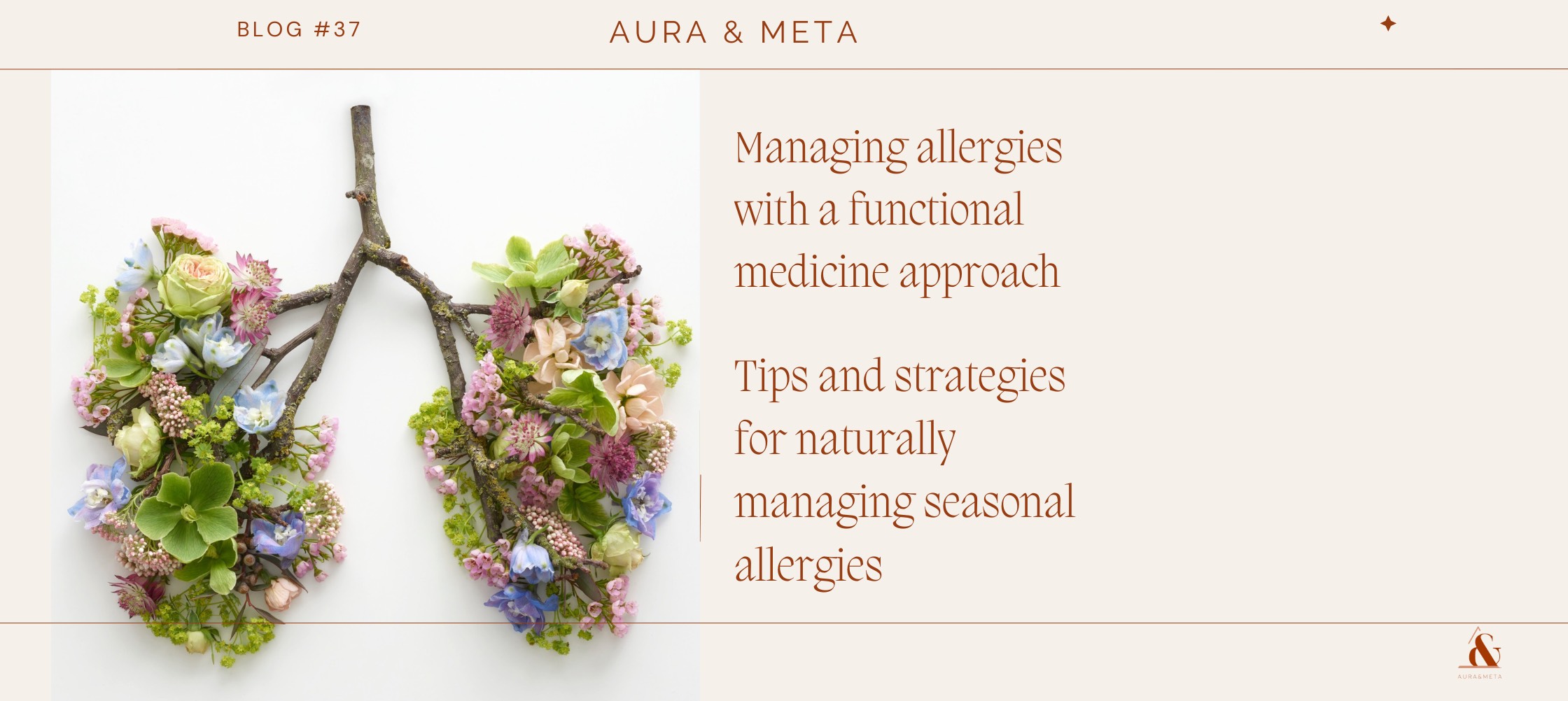Seasonal allergies, commonly known as hay fever or allergic rhinitis, spike during the spring and summer months. These allergies are often triggered by environmental allergens like pollen, mold spores, and grasses. Functional medicine takes a holistic approach to managing allergies by addressing the underlying mechanisms and triggers, predispositions, and utilizing natural strategies for relief.
Mechanisms of Seasonal Allergies: Understanding the ‘Why’
Immune System Dysregulation
Allergies occur when the immune system mistakenly identifies harmless substances as threats, leading to an immune response. This reaction triggers the release of histamines and other inflammatory mediators from mast cells, causing symptoms like sneezing, itching, and nasal congestion.
Inflammatory Response
The release of histamines and other chemicals causes inflammation in the nasal passages, eyes, and respiratory tract. Chronic inflammation can exacerbate allergy symptoms and contribute to other health issues.
Gut-Immune Axis
The gut plays a crucial role in regulating the immune system. An imbalance in gut microbiota (dysbiosis) can lead to increased intestinal permeability (leaky gut), contributing to immune dysregulation and heightened allergic responses. Learn more about the gut-immune connection.
Triggers of Seasonal Allergies
Environmental Allergens
- Pollen from trees, grasses, and weeds
- Mold spores
- Dust mites and pet dander
Lifestyle Factors
- Stress
- Poor diet
- Lack of sleep
- Environmental pollution
Genetic Predispositions
- Family history of allergies or asthma
- Genetic variations affecting immune function and histamine metabolism
Functional Medicine Approaches to Managing Seasonal Allergies: Offering Solutions
Identifying and Minimizing Triggers
Environmental Control: Keeping windows closed during high pollen periods, using air purifiers, and regular cleaning can reduce indoor allergens. Personal Care: Showering and changing clothes after being outdoors can remove pollen from your body and hair.
Supporting Immune Function
Diet: An anti-inflammatory diet rich in fruits, vegetables, whole grains, lean proteins, and healthy fats can help. Foods high in quercetin, like apples, onions, and berries, can stabilize mast cells and reduce histamine release. Probiotics: Supplementing with probiotics supports gut health and improves immune regulation. Fermented foods are also beneficial. Vitamin C: Acts as a natural antihistamine and antioxidant, found in citrus fruits, bell peppers, strawberries, and broccoli. Omega-3 Fatty Acids: Found in fatty fish, flaxseeds, and walnuts, omega-3s reduce inflammation and support immune health.
Healing the Gut
Elimination Diet: Removing food sensitivities that contribute to gut inflammation and immune dysregulation. Common culprits include gluten, dairy, and processed foods. Gut-Healing Nutrients: Supplements like L-glutamine, aloe vera, and slippery elm can repair the gut lining and reduce intestinal permeability.
Reducing Systemic Inflammation
Herbal Supplements: Curcumin (from turmeric), ginger, and green tea extract possess potent anti-inflammatory properties. Hydration: Drinking plenty of water helps flush out toxins and maintain mucous membrane health.
Balancing Histamine Levels
Natural Antihistamines: Herbs like stinging nettle reduce allergy symptoms. Histamine-Lowering Foods: Opt for foods low in histamine and avoid those high in histamine if you have histamine intolerance.
Stress Management
Mindfulness and Relaxation Techniques: Meditation, yoga, and deep breathing exercises can reduce stress and improve immune function. Adequate Sleep: Sufficient restorative sleep is crucial for immune health and reducing inflammation.
Personalized Functional Medicine Plan
Comprehensive Testing
We may use detailed lab tests to assess immune function, gut health, nutrient levels, and potential allergens. Click Here To Learn More
Individualized Treatment Plan
Based on test results, a personalized plan including dietary changes, targeted supplementation, lifestyle modifications to address underlying imbalances is developed.
By addressing the root causes and underlying mechanisms of seasonal allergies through a functional medicine approach, individuals can achieve better symptom management, improved immune function, and enhanced overall health. This holistic and personalized strategy not only alleviates allergy symptoms but also promotes long-term wellness.
Empower yourself with the knowledge to manage histamine intolerance effectively. For more guidance on personalized dietary plans and lifestyle adjustments, visit our services page or book a free discovery call to get tailored advice based on your unique health needs.

